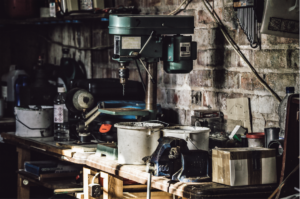Flipping homes is an idea that has captured the minds of would-be real estate investors in Seattle thanks to a few popular HGTV shows, free real estate investor websites like Bigger Pockets, and paid advertisements of “gurus” on Facebook.

Today home flipping is probably the most popular strategy for making money in real estate investing. “Flipping” means locking up a property under contract, buying it, fixing it up , and reselling it.
To some people, there is overlap with the term “wholesaling” which means getting the property under contract, but then selling, flipping, or assigning the contract to another investor who will end up doing the eventual repair work on the property and reselling it. This way, two investors make a profit, although the wholesaler usually makes less because he has less risk from financing, repair costs, and market shifts while he’s holding. The guy who does the rehab takes on these responsibilities, and therefore he has more risk and hopefully more profit potential.
The majority of the work of a wholesaler is done in the arenas of marketing to motivated sellers (often people with a house that is behind on payments, facing foreclosure, going through probate, a previous rental that’s had tenant damage, or a home that’s just in need of extensive repairs) and negotiating a favorable deal with them.
Flipping houses as a rehabber can be a viable way to make a significant return on your investment, but there are also pitfalls to avoid and a fairly established procedure you should follow. The really good news is that you can make a decent profit flipping homes in almost any kind of market – as long as you take the right steps in the proper order. To help you get started in this popular area of real estate investing, here’s our beginner’s guide to flipping homes in Seattle.
Know Your Numbers: Do The Math First

The first step in the adventure of flipping homes in Seattle is getting a handle on all the numbers.
Before doing anything else, you need to carefully consider and fully understand the business model for your real estate investing.
What are these figures going to be in your marketplace?
- Purchase price range – If you are willing to rehab a townhouse or condo, you may be able to find something in the $200-$300K range. Single Family homes are more expensive.
- Repair Budget – The amount you can comfortably spend on rehab and repairs. In the Seattle area, most homes that are sold as “rehab” properties will need on the order of $50K+ in repairs.
- Your marketing budget and resources – how are you going to find these properties, and how are you going to sell or rent them?
- Available funds to cover closing costs, insurance, commissions, and taxes.
On the selling end, you’ll need to determine how long you can afford to keep the house on the market till you get your desired price and how much you can afford to reduce the price in order to sell quicker. After the rehab is done (on budget!) the big risk is that you will pay a mortgage for months and months as an overpriced property languishes on the market if the market softens or prices fall while you are in the midst of the rehab.
The good news is that Seattle homes tend to sell quickly and a newly-remodeled home should not sit on the market long. However, be sure to take into account the time your buyer will need to do inspections and get financing.
Get Your Financing Squared Away
After you run the numbers and do all the math, you’ll need to get your financing squared away. Where are you going to get $400,000 or more to do these deals?
- Do you have cash sitting in the bank?
- Do you have a partner?
- Will you get a loan?
- How about a HELOC on your primary residence?
- Some people invest with their 401K or other retirement accounts.
If you do need to finance at least part of the purchase price, you’ll need to figure your best borrowing option – for example, hard money or private money. Lenders often charge higher interest rates for loans on investment property than they do on loans against your primary residence. It makes sense to approach lenders in advance of finding a deal, as – when the time comes – you may need to be prepared to move quickly. The ability to close quickly without a financing contingency is often a make-or-break qualification for getting a low-priced offer to be accepted.
Choose Your Market Wisely
A critical consideration for flipping homes in Seattle is finding the best local market for your financial situation and investing needs. The area where the property is located will determine both purchase and sale price, desirability for buyers, and how much return you can realize on your investment.
Historically hot markets may have fewer older homes that have not been rehabbed yet. Rehabbers and developers have been pulling down property and rebuilding on lots in Greenlake, Ballard and other hot areas for years. These days they are often building high-density townhomes on a plottage of one or two single family residential lots.
For less expensive prospects, outside of downtown Seattle in the secondary markets. Everett, WA, or Marysville, WA to the North; Bremerton and Kingston out on the Penninsula are options to the West; East are Monroe and Woodinville; and don’t forget about Kent, Renton, Lacey, Olympia or Tacoma to the South.
Typically, when flipping homes, you will put the property back on the market within 60 to 90 days of purchase – if you can get the rehab done that fast. And the area often affects whether you can sell at your desired price and how quickly you can sell and realize an ROI more the specific property. Don’t forget to consider the time of year your property will be ready for sale. Seattle typically has its strongest bursts of activity during Spring and Fall. The real estate market can move a little slower during the winter months and Christmas time.
Start Hunting for Deals
Now, at this point, it’s time to start hunting for potential investment properties – especially those good deals that won’t require a ton of rehab money and will allow you to make a tidy profit. Your best bet here is to work with a Seattle real estate agent who has experience with investment properties. If the agent knows what you’re looking for, she can keep her eye out for properties on the MLS that meet your needs, and if she is actively involved in marketing for new sellers, she can refer leads to you when the seller may be more likely to benefit from working directly with an investor rather than listing the home.

Often new investors over-estimate their profits and under-estimate their costs on their first real estate investments. 
Consider a deal with plenty of margin for your first real estate flip. 
Real estate deals for flipping can come in all shapes and sizes, just make sure the numbers work.
In addition, if you are serious about flipping homes in Seattle as a business, you should plan to generate leads on your own. Having a good website, is a great start. Many investors also market on Facebook, Craigslist, YouTube, and via direct mail, cold calling, and networking.
You’ll need to generate plenty of leads and formulate a solid marketing plan. To find out how an agent can help you locate the kind of properties you need, call (206) 578-3438.
Get Your Team Together
You will also need to assemble a team because there are too many varied tasks and pieces for you to do it all on your own and do it well. Early on in my investment career, I wanted to do everything myself. I found that hiring good help and using a team dramatically improved my quality of life and made my deals go more smoothly, too.

Paying a little extra for qualified professional help will ensure greater efficiency and most likely a quicker and better return on your investment.
At the least, your team for flipping homes in Seattle should include:
- A Real Estate Agent – to help you buy, get comps, and sell
- A Real Estate Attorney, especially if you are acquiring property without a real estate agent and/or buying on terms.
- An Investor-Friendly Title Insurance And Closing Agent (could be the same as the attorney)
- A Contractor who can hook you up with the various tradesmen: plumbing, painting, electrical work, landscaping, and drywall.
When it comes to flipping homes, time is money, and your team can help you cut down on the time invested which will minimize your holding costs.
Rehab and Be Ready for Setbacks
Murphy’s Law is the name of the game when it comes to doing rehabs. There is always something that goes wrong: The Hardware store ran out of the type of tile you need, the contractor didn’t show up on time, and now he won’t call you back, there is mold behind the drywall and you have to take everything down to the studs. These “surprises” cost money.

When it’s time to get down to the actual rehabbing and repair work, make sure you have your budget dialed in, with a large pinch of salt for safety.
Another problem some new rehabbers have is the tendency to over-improve the property. You may be tempted to use the nicest materials to help the home sell for more, but in some areas, over improving a home does not drive up the price because the nearby homes in the area do not support a higher sales price.
The one principle to keep in mind at all times is that you shouldn’t invest more in the rehab than you can recover at sale time. Sometimes it’s better to invest less in the rehab and sell at a lower price in order to make more profit. The other thing to keep in mind is that you will always encounter setbacks, difficulties, and delays at this stage. So be sure to be prepared for these and allow time in your investment plan for them.
List and Sell

The last step in flipping homes in Seattle is listing and selling the property. This is when you can take it easy, let your real estate agent do all the work, and sit back and get your check!
Speed is paramount because you are paying taxes and utilities for your empty house on the market, and probably a high interest rate on your loan, too.
The more quickly you sell, the sooner you’ll get your investment-plus-profit back, and the sooner you can move on to the next flipping project.
While there is some risk involved, if you know what you’re doing flipping carries less risk than other kinds of real estate investing because you are in-and-out of the deal quickly, and you never have an unpredictable tenant in charge of the property. You have less market exposure and minimize the risk of the market turning down while you are holding the property.
A good agent can help you minimize that risk, especially in this last critical stage. Ready to get started flipping homes and making a profit? Just send us a message or give us a call today! (206) 578-3438
